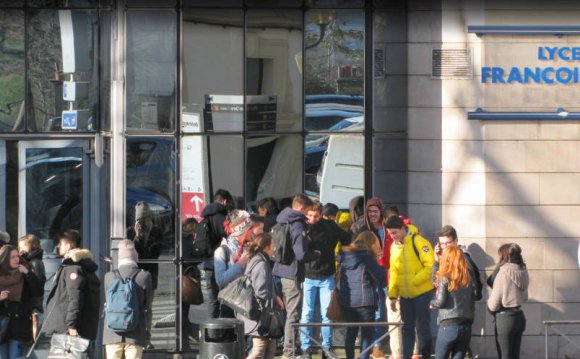
In France, secondary education is in two stages:
- collèges (French pronunciation: ) cater for the first four years of secondary education from the ages of 11 to 15
- lycées provide a three-year course of further secondary education for children between the ages of 15 and 18. Pupils are prepared for the (baccalaureate, colloquially known as le bac). The baccalauréat can lead to higher education studies or directly to professional life.
Organization of the school year[edit]
The school year starts in early September and ends in early-July. French school holidays are scheduled by the Ministry of Education, by dividing the country into three zones (A, B, and C) to prevent the overcrowding by family holidaymakers of tourist destinations such as the Mediterranean coast and the ski resorts. Lyon, for example, is in zone A, while Marseille is in zone B, and Paris and Bordeaux are in zone C.
In contrast to the practice in most other education systems, the various school years in France are numbered on a decreasing scale. Thus, pupils begin their secondary education in the sixième (6th class), and transfer to a lycée in the seconde (2nd class), while the final year is the terminale.
In French, the word for "étudiant(e) collège and lycée students are referred to as élèves pupils or students in English).
The curriculum (le programme officiel) is standardized for all French public institutions. Changes to the programme are made every year by the French Ministry of Education and are published in the Ministry's Bulletin Officiel de l'Éducation Nationale (BO), the official reference bulletin for educators.
Collège[edit]
| Collège | ||
| Age | Name | Abbreviation |
|---|---|---|
| 11-12 | Sixième | 6e |
| 12-13 | Cinquième | 5e |
| 13-14 | Quatrième | 4e |
| 14-15 | Troisième | 3e |
The collège is the first level of secondary education in the French educational system. A pupil attending collège is called collégien (boy) or collégienne (girl). Men and women teachers at the collège- and lycée-level are called professeur (no official feminine professional form exists in France although the feminine form "professeure" has appeared and seems to be gaining some ground in usage). The City of Paris refers to a collège in English as a "high school."
Entry in sixième occurs directly after the last year of primary school, called cours moyen deuxième année (CM2). There is no entrance examination into collège, but administrators have established a comprehensive academic examination of students starting in sixième. The purpose of the examination is evaluating pupils' level on being graduated from primary school.
Curriculum[edit]
The table at the right details the French curriculum. Along with three-to-four weekly hours of physical education, a typical school week consists of some twenty-six (26) hours of schooling. French language and literature occupy the most time, 4–5 hours per week, followed by mathematics, 4 hours per week; other subjects occupy some 1.0-3.5 hours per week.
The curriculum is devised by the French Ministry of National Education and applies to all collèges in France and also for AEFE-dependent institutions. Académies and individual schools have little margin for curriculum customisation. Teachers compose syllabi per precise government educational regulations, and choose textbooks accordingly; every major French publishing house has a textbook branch.
Process and purpose[edit]
Each subject is usually taught by a different "professeur" or teacher; most teachers teach several different age groups. Collège pupils stay in the same class throughout the school year, and in every subject (except for optional courses such as foreign languages, where students from several classes mix), so each grade is divided into as many classes as necessary. The strong belief in teaching in mixed-ability classes means that streaming is rare.
Class size varies from school to school, but usually ranges from 20 to 35 pupils. Each class has a professeur principal (main teacher or class tutor) who is the link between the teaching staff, administration, and pupils.
Ultimately, the role of the collège is to prepare students for the advanced subjects of the lycée. At the end of the troisième class, students sit for le diplôme national du Brevet, an end-of-collège examination; The brevet is not required for entrance to the lycée, nor does passing it guarantee that a pupil will progress to the higher-level school.
During the last conseil de classe of the year, held in June, teachers and administrators decide whether or not a pupil can progress to the next grade. In deciding, they evaluate the student's skills, participation, and behaviour. Three outcomes are possible:
- the student progresses to the next grade;
- his or her redoublement (repeating the year) can be required;
- he or she can, in specific cases, be offered to skip a grade and be promoted two grades.
Carte scolaire[edit]
French parents are not free to choose the state school that their children will attend; unless the children have special learning needs, they will attend the school allocated to them by the carte scolaire (school map). Reasons for attending a state school which is not their nearest include studying an option unavailable in the school to which they were originally assigned (e.g. a rare foreign language).
RELATED VIDEO












